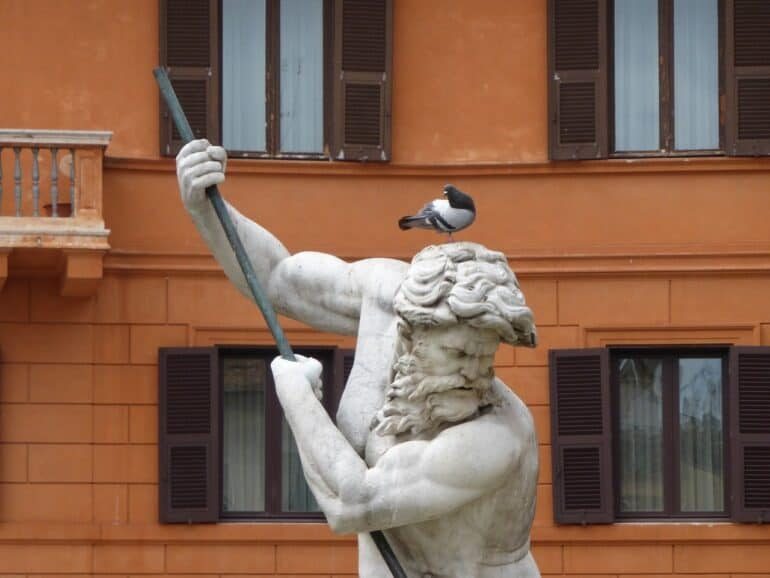What it’s like to live in Italy during the quarantine
A diary about the lockdown in Italy from the day before the entire country would be put into quarantine.
The day before Italy would be put into quarantine
On Monday, March 9th, the day before all of Italy would be put into quarantine, I went for a long walk from my apartment at the top of Gianicolo Hill to the centre of Rome. Even then, things felt differently than they usually do in Rome, a city that is often bustling, full of tourists and carefree people sitting in piazzas, drinking and laughing and enjoying life to the fullest. I stopped by a bar to get an Aperol spritz, a classic Italian drink, and already there were warnings posted about the coronavirus, explaining that everyone needed to stay apart from each other at least one metre. The workers were wearing plastic gloves, which is not commonplace in Italy, and it added a feeling of distance between me and the woman at the register. Such a feeling of distance is not usual in Italy, a country where its people are so warm and friendly, but it was necessary in these times. On the glass counter separating me from the man preparing food and drinks, there was a bottle of antibacterial gel available for anyone to use. These were all effects, direct and indirect, of a recent decree that had been put in place to keep the spread from getting worse in all of Italy.
As I walked through Campo de’ Fiori, which is usually full of tourists eating in every part of the piazza, most of the restaurants were closed, with only one or two open, and waitstaff standing anxiously outside, hoping that by some miracle, someone would pass by who would be willing to sit somewhere and eat. I continued walking, the streets emptier than I had ever seen them in Rome, even emptier than in the middle of winter, when tourist season is at its minimum, and the quiet was unnerving. I saw people walking by wearing face masks, and whenever we did walk by each other, a distance was kept, which made the atmosphere of Rome feel even more unnerving. As I waited to cross the last busy street I would need to cross before arriving at Piazza Navona, there was far less traffic than usual, and there were few people around me—a rarity in this very spot, which was usually packed with tourists waiting to get to the famous square full of Bernini’s famous fountains.
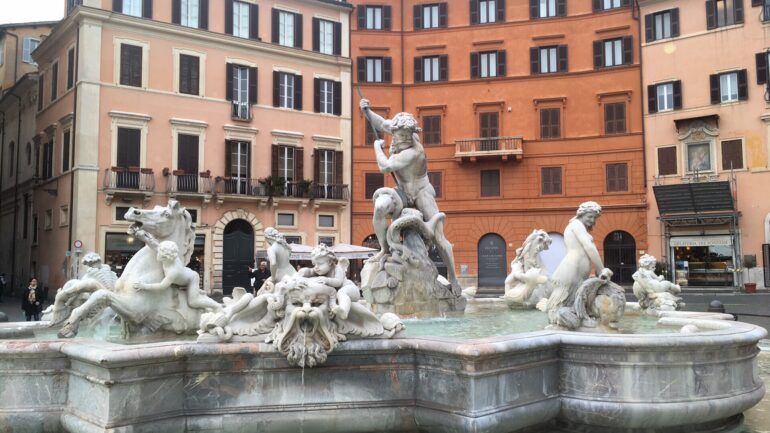
There was a guided tour there, maybe two, looking up at the famous Fountain of the Four Rivers. Some couples and small groups, too. The restaurants, just like in Campo de’ Fiori, were closed or had few customers. This usual space which is almost always packed was nearly empty. I continued to walk to the other end of the piazza, where the Fountain of Neptune caught my eye. All of a sudden, looking at the fountain, at the figures fighting bravely against creatures coming out of the water, I couldn’t help thinking about the struggle Italy was currently having with the coronavirus. Even though these problems all felt so far away—mostly in the north of Italy, with Rome only having had a few cases—I couldn’t help feeling that struggle present with me as I looked at the fountain. Neptune struggling to kill an octopus, women and cupids fighting with sea monsters and swans, I felt that this fountain represented the eternal struggle of man versus nature. Looking at it, I felt that this must have been a place where time after time, century after century, people going through events similar to what was happening now must have seen this fountain and felt exactly what I was feeling. In the Eternal City.

And yet, this feeling diminished significantly after I left the piazza. Everything going on with the coronavirus really did feel like it was far away, up in the north of Italy. For a few weeks now, there had been quarantines in place in the towns where it had spread, and numbers were low in other parts of the country. The entire region of Lombardy was now under quarantine, which meant we were even safer here in Rome. The American University of Rome, where I’m teaching this spring, had been keeping all faculty and students informed of changes going on, and spring break had been extended in large part not necessarily because of safety (even though that was a factor), but also to make things easier for our students, many of whom were being asked to return to the United States by their home institutions. We were getting emails daily on what numbers to call if we were feeling unwell and experiencing symptoms of the coronavirus; everything felt under control to me, and many of the measures being taken felt preventative, which was a great comfort. I had a few friends who were nervous about going out, and some friends back home who worried for me, but everything felt that it was normal, except for the streets being emptier, more restaurants being closed, the tram my friends and I rode to Trastevere that night, where we were going out for dinner, being nearly empty, too.
How I found out that all of Italy would be put in quarantine
But then, at the end of dinner, I started getting messages from friends who weren’t in Italy, on Facebook Messenger, on WhatsApp. Asking if I was okay in Italy. I said to my friends at dinner, “What’s going on? Everyone is messaging me. They need to calm down.” I sent a picture of my dinner to a worried friend, making sure to include the large glass of wine I was drinking in the shot. I was living la dolce vita; no one had any need to worry. But then a friend in Spain, who had been keeping up with the coronavirus situation far more intensely than I had been, messaged me: “Elisa are you tuned into Conte’s latest update?” Of course I wasn’t. I wasn’t worried; I had believed all along that what made the most sense in times like these was to remain calm and not get carried away by fear or the media. Which I still believe—but now I have learned that not getting carried away can still mean staying up to date with what’s going on, and taking necessary precautions for the sake of yourself and others.
That was how I found out that now all of Italy would be put in quarantine. That flights would start to get canceled. That my trip to Spain, which I was planning on embarking on the coming weekend, was no longer going to happen. My reaction at that moment was purely emotional; I had never felt trapped like that before. All of us were stunned, already things were beginning to feel surreal. The fact that we had found out so late at night, with the rest of Italy, when the streets were already so deserted and Rome so much more quiet than usual, intensified the surrealness. It completely changed the mood of the evening. We rode the tram back up; I scheduled a time to talk to my parents. We were all contacting our family and friends. We would look down at our phones regularly, sending a message or voice note, then back up at each other, comforting each other, hoping that everything would be okay, and telling ourselves and each other that it would be.
We didn’t know what this quarantine meant for us, what it would be like. What we did know was that, whatever that new reality might be, it was the new reality we would wake up in the next morning.
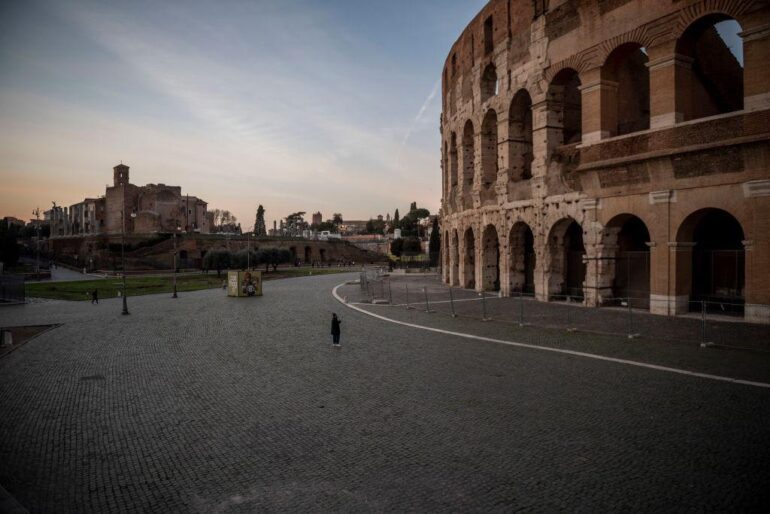
What waking up in quarantine feels like
If you have ever been through a breakup—especially a sudden breakup—that was what waking up in quarantine, on Day One, was like for me. Sure, I was still where I lived, I was still me, I was still going to wake up at a certain point, shower, make coffee, face the day. But first, I was on my phone for two hours in bed, still a bit paralysed by the news. I was reading about the rules of the quarantine, what they meant for me; I was reading about the coronavirus and how it was spreading to other places now, and how so much of that spread seemed similar to what Italy had been experiencing just weeks earlier; I was messaging friends about it. I finally got out of bed, telling myself that the day had to start, quarantine or not, and that I could at least go to park. I wasn’t entirely trapped by it.
Even my disappointment about not being able to go to Spain—where I had been considering going earlier, in case something like this happened—turned into being pleased that I hadn’t gone. If it was necessary to stay in Italy, I would stay in Italy. I couldn’t think about only myself, a low-risk 31-year-old woman. The best thing to do for the country of Italy, and the world, it seems, considering how quickly the virus is spreading now in my home country of the United States, was to stay exactly where I was. I did not want to be part of the problem. I wanted to do what I could to keep the situation from getting worse. Part of me knew, too, that if the quarantine was happening now, it probably should have happened sooner. In the next few days, it would become even clearer just how out of control the virus is worldwide and how easily it spreads. Just one day after the first day of the countrywide quarantine here, it would be announced by the World Health Organisation that this outbreak was now a worldwide pandemic. A few days after that, Spain would go into lockdown. I am sure that other countries will soon do the same.
Having so much to think about, in combination with being totally stunned, meant doing stupid things that morning, such as forgetting to put water in my moka pot when making coffee. And arriving late for a phone meeting with a ghostwriting client because I’d forgotten that, with Daylight Savings in the United States, the time difference between her and me had changed. I’m sure other people under quarantine have had similar experiences, of being forgetful and distracted and confused. Because when you’re suddenly in a state of existence brought about by an emergency like this one, where your mind is so overwhelmed by all the changes going on around you, you can barely perform basic functions. Like with so many experiences in life—especially ones created by strange or unexpected circumstances—you never really know how you’re going to react to a situation until you finally find yourself in it. There was no way I could have mentally prepared for quarantine, and now here I was, in quarantine. It would take a while for my mind to catch up to what was actually going on.
When I finally forced myself to go outside—something I had a strange resistance to, because it felt like by going outside and seeing what the world was like in quarantine, I would finally be accepting this new reality and its impact on me—I still felt stunned. I ran into a woman as I was exiting my building, and as we both said “Buongiorno” to each other, there was a certain awkward stiffness to the exchange. We had to keep our distance, for one thing, but in addition, with things having changed overnight in Rome, there was also a way in which, without meaning to, we were assessing each other for a brief second, registering fear in an automatic way, the way people did perhaps once in nature. But in addition there was a kindness in our voices, which expressed the fact that we were together in a difficult situation. This same feeling continued in the grocery stores I visited, where people kept their distance but tried to act as normally and civilly as possible. We made room for each other in the grocery stores, respected space so that no one would feel too frightened or uncomfortable. In Italy, by the way—the same as in Wuhan—we are allowed to go to grocery stores while in quarantine, and stores are fully stocked, which the government has guaranteed to us during this difficult time. The wait to buy food only happens at certain times of the day, and only for safety reasons so that, inside, there can still be a metre of distance between people. At these times, you may have to wait in the queue for 20 or 30 minutes, and you may have to wait to be let inside. It all feels very rational, though, so even though there is a sense of the surreal, there is no sense of panic.
The silver lining: the good things about quarantine in Italy
There were good things about the quarantine, too—which is a strange thing to say about a quarantine, but it’s true. There was a real sense of, We are all in this together, which in the days since Day One has transformed into an intense solidarity that is felt coming from the outside world even from your room where you have spent most if not all of your day. As my friend who is in Spain right now, where things have been changing quickly too, said, “The sense of humanity came back to us all of a sudden, in times of emergency.” The quarantine also made everyday things unexpectedly beautiful. On that first day of quarantine, listening to Nancy Sinatra’s “Sugar Town” on my way to the park took on a whole different energy and meaning, and my first sip of Prosecco that evening was one of the best sips of alcohol I have ever had in my life. I envied friends in quarantine who got to stay at home with their boyfriends; one can only imagine what quarantine sex would be like.
At least I wasn’t alone in my quarantine. I had some friends who, unfortunately, would have to weather this out on their own. Even though I wasn’t with family or friends I had known for a long time, I was now in quarantine with Aldo, a Mexican chef who would now be cooking us tons of meals (and who had lost his job due to the quarantine, unfortunately), and Birgit, a Dutch journalist who had moved to Italy to pursue her dreams of becoming a news correspondent in Italy (where she also planned to live la dolce vita, but that would have to wait). We all got along incredibly well to start with, and the quarantine is already bringing us closer together. When we found out about the more intense quarantine rules that were announced on Wednesday evening, and I read an article in a publication for expats in Italy that had the erroneous information that I wasn’t allowed to go the park anymore, I got incredibly upset. Now that I had finally gotten used to the idea of being in a quarantine, and I had even created a ‘quarantine schedule’ for myself modelled on one I’d seen online made by a family in Wuhan, I was going to lose something that would brighten my days immensely during this hard time: the chance to go outside for a walk in the park. My flatmates, seeing how incredibly upset I was, immediately came to my aid, and we drank and talked until 3 in the morning.
“Tomorrow,” Aldo said, “I will make a flan for us. Dessert, to make us feel better.”
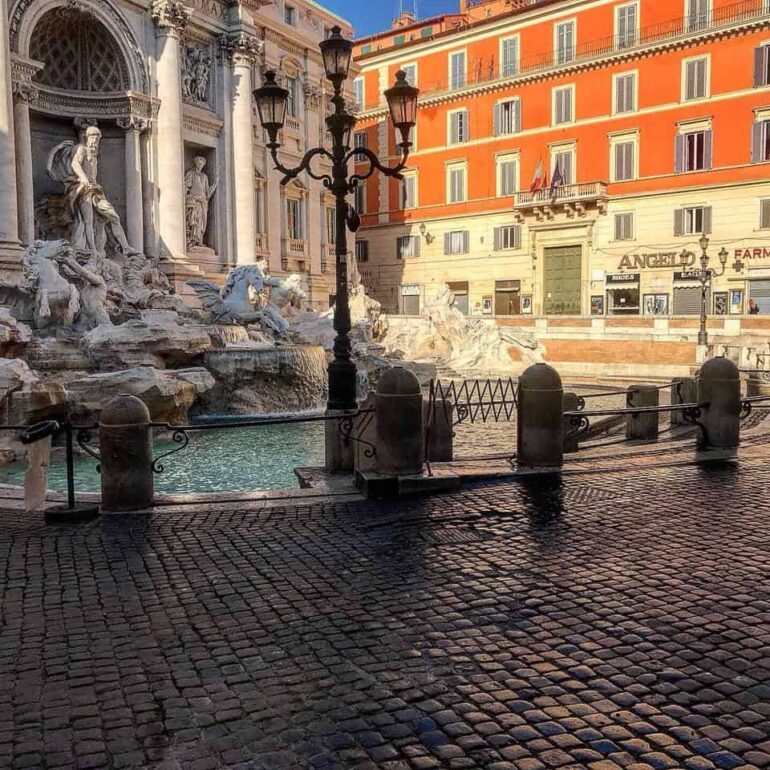
The importance of changing your behaviour
It did turn out that I was wrong that night, and that even though with the restrictions in Italy our movements were even more controlled, with all bars and restaurants and unnecessary shops closed, we were still allowed to go out for exercise alone, ensuring we kept our distance from others. But having been in quarantine has done more than merely limit my movements within the world: it has changed the way I see the coronavirus situation entirely. Which is why I told myself not to go to the park, certainly not for the next week, possibly two. I decided to stay home as much as possible, except to buy groceries. (Just two days ago, Saturday, the government has made this decision for all of us, closing parks and public playgrounds until March 25th.)
My usual behaviour, of being a free-spirited, fun-loving, adventure-chasing woman who spent six months in 2018 living out of a suitcase and crashing with friends all over Europe, is completely different now. Just two weeks earlier, when Birgit had just arrived, we went out one night “for only one drink,” and ended up dancing at a nearby place until it closed, where I got on stage and sang a ton of party songs, and where the host was drinking Corona beers and drunkenly joking to the crowd, “Coronavirus, coronavirus!” We were young, we were unafraid, we were free. The day before the quarantine had been announced, I had told a friend, “Well, ideally, the university will stay closed until the end of April, so I can enjoy Spain, then travel a bit more—maybe Edinburgh, maybe Prague with you?—while teaching remotely.”
Now, I realise how dangerous that kind of thinking is. Traveling, in the midst of all this? That’s crazy, irresponsible, selfish. If you take anything away from this article, I want you to come to understand that, even though there is no need to panic, there is a need to change our behaviours immediately. Italy did this too late, and now they are paying for it. Unfortunately, the number of known cases are far lower than the actual cases, and it’s hard to track how quickly the virus is spreading. Once it gets bad enough, more people die, because hospitals are so overwhelmed. Doctors get sick having to see so many patients, and endanger the lives of those around them even more. Retired doctors have been asked to help with the effort—completely risking their lives. The sooner the crisis is avoided, the better, because now, not only people infected with the coronavirus are dying. Anyone with any medical need at all now is at risk, not necessarily of catching the virus, but of not being able to be treated. So it needs to be stopped as soon as possible, and this means self-isolating even if your government or job isn’t asking you to do so. Unfortunately, this virus spreads rapidly. It was just declared a pandemic. Things are going to get much worse before they get better.
My father, who is an economist, recently shared this article with me, “You Must Act Now,” which he says is the best explanation he has seen so far of the spread of the coronavirus. This article encourages world leaders and business leaders to take the situation seriously before it suddenly worsens—because it’s exactly that, a situation that seems mild until it suddenly is not. It also discusses what a disparity there is between confirmed cases and actual cases. If your government or workplace isn’t doing what they should be doing, you need to do what you can to stay at home. If you’re living somewhere like New York state, which had over 400 cases of coronavirus as of Friday afternoon (confirmed, so chances are there are many more), please stay at home. Even if there are economic effects, please do it. Otherwise, many people will die, and the situation will drag on far longer than it has to. It scares me how much the situation in the US reminds me of how it recently was in Italy. And I’m scared of how much worse it will become than in the current situation in Italy, considering how broken the American healthcare system is, and how challenging it would be to maintain regulations of quarantine or self-isolation.
That probably is the worst part of being in quarantine here in Rome. Even though many of my friends are worried about me, messaging me constantly, I’m actually ridiculously safe, now that the quarantine has been established here in Italy—and it’s them who are in danger now. I’m worried about my older parents who are based in Uruguay, where cases are now emerging. I’m worried for my brother and friends who live in the United States, where the situation is already getting out of control. This hasn’t appeared in the media, so I don’t know how true it is, but stories are emerging from friends of friends of younger people dying from it, too. I imagine this has to do with overwhelmed hospitals, but I don’t know anymore: a friend in Scotland just told me about a girl he knows in London who just lost two friends, aged 39, due to the virus. Whether or not this is true, it adds more worry on my end for more people. Perhaps they were immunodeficient.
Whatever that situation may be, we all have loved ones who are at risk for catching this quickly-spreading virus. Even if you aren’t at risk yourself, you have to think about all of humanity.
That’s part of why I have chosen to stay in Italy. Not only because it is safer, but also because it would be irresponsible for me to leave. Of course, it’s natural to want to leave Italy in the middle of this crisis—it’s tempting. I have a US passport, which means I was allowed to leave the country even after the quarantine had been put in place and the borders were closed. But I have chosen to stay here in Italy. Everyone should stay exactly where they are. If the world comes to a standstill for just a few weeks, we could significantly slow the spread of the virus. It’s simply what we have to do.
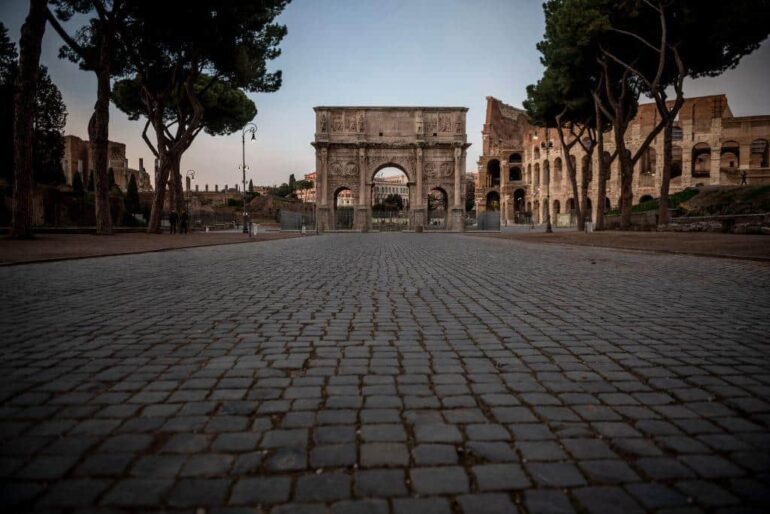
Singing from balconies: Italy’s sense of solidarity
Since the first few days of the quarantine, things have begun to feel more normal. Even though I haven’t yet started my ‘quarantine schedule’ due to all the mental health days I’ve been taking, I’ve started to get used to it much faster than I thought I would. I find that the mornings are hardest—this morning I cried while talking on the phone to a friend—but things get easier as the day goes on. Going outside just for ten, twenty minutes to buy groceries starts to feel much longer, so I don’t feel too cooped up. Phone conversations with friends—and I’ve been having about three of those a day—start to feel more and more intimate, as if I am there with them. Other friends of mine stuck at home and I are planning aperitivo nights where we’ll drink and chat about our days. Birgit and Aldo are there for me, too. We talk about the coronavirus quite a lot, but about other things too, cooking together and drinking together and becoming closer. As someone who has lots of experience working online, I’m going to help Aldo find jobs teaching Spanish, and Birgit and I are encouraging each other as writers to get the word out about what’s going on.
The virus isn’t the only thing that is spreading in Italy. So is a sense of solidarity and of understanding what the right thing to do is. I felt that solidarity most on Friday evening, when Romans, following the example of other parts of Italy, stood out of their balconies together for the first time, with music playing loud from a speaker while they all sang the Italian national anthem. Aldo came into my room, said, “Listen, do you hear that?” We opened my window, I went to get Birgit, and we all stood together leaning out, listening, watching the Italians sing. An elderly woman cried in a walled garden below us; I can’t imagine what this situation must be like for her. After the anthem ended and another song came on, she waved at us, and we waved back, saying “Ciao!” from across the street. At the end of it all, as everyone was going back into their homes, she referenced the fact that this was something that would be done at 6 p.m. every day during the quarantine.
“Ciao!” she said to us, “A domani!”
Goodbye, she’d said. Until tomorrow. At the same time, every day, we will demonstrate that we are all together in this, even when we are not able to be together. In that same sense, I think that during this coronavirus crisis, we are all in the world together in this, however far apart we may be.


